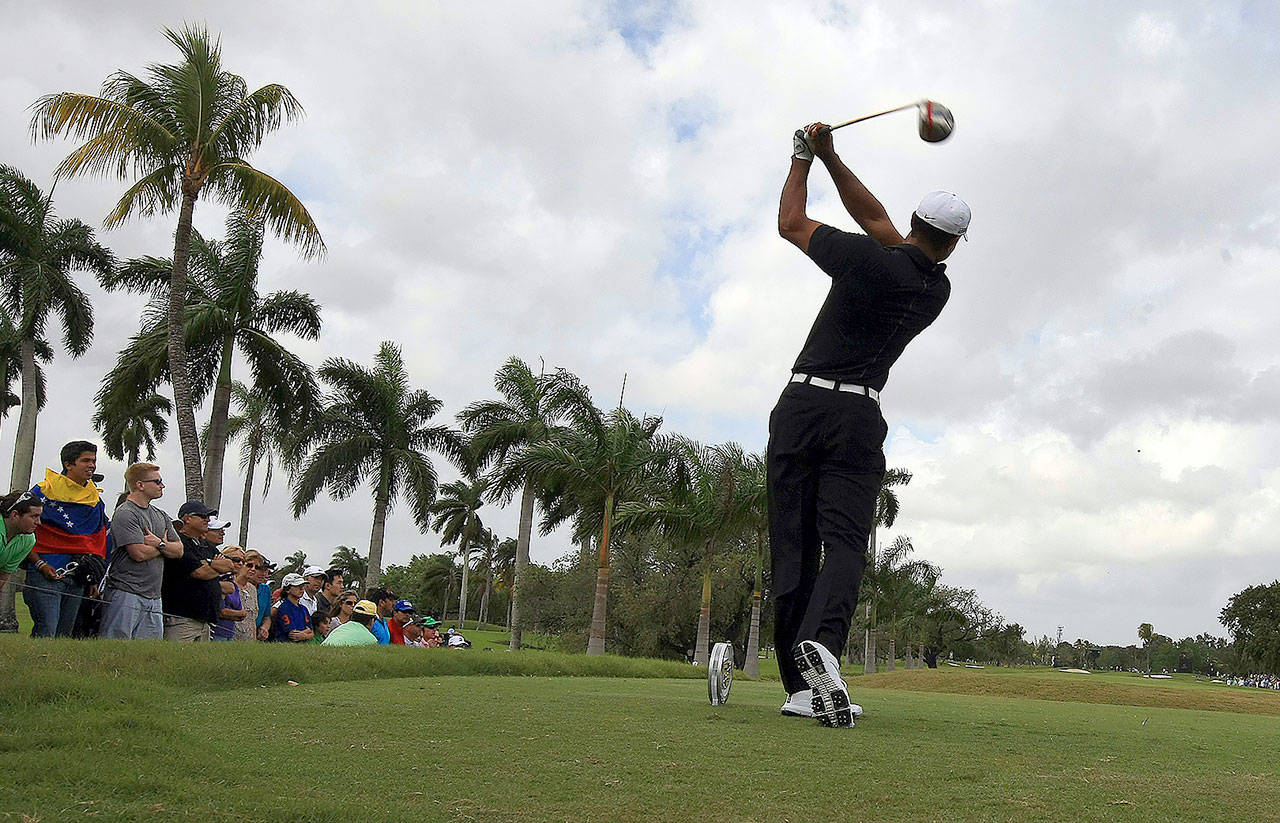MIAMI —The presidency hasn’t been kind to Donald Trump’s prized Miami resort.
Even with the most famous hotelier in the world as its namesake, the Trump National Doral Miami has lost ground to its local competitors and seen profits drop since Donald Trump took office.
A consultant the resort hired to contest its Miami-Dade tax bill told a magistrate late last year that a “negative connotation” with the Trump “brand” helps explain the decline.
“There’s clearly been factors that have influenced the hotel,” Miami consultant Jessica Vachiratevanurak told a magistrate for the county’s Value Adjustment Board on Dec. 5. “There is some negative connotation that is associated with the brand.”
The comments were first reported by The Washington Post on Wednesday as part of the paper’s look at how the Trump presidency intertwines with the Trump business empire.
The Trump Organization’s Doral resort is a key corner of that commercial enterprise, ranking as the No. 1 source of revenue for then-candidate Trump in his first disclosure form as a presidential candidate four years ago. It held the same rank in the president’s 2018 financial disclosure form, with reported income to Trump of $75 million.
But that’s down from $116 million in the president’s 2017 report, and the hotel itself described a similar drop-off in profits as it appealed its 2018 property tax bill. The Post described it as “the first known case in which a Trump Organization representative has publicly acknowledged the president’s name has hurt business.”
With Trump’s divisive presidency —polls show he’s popular with his Republican base and strongly disliked by Democrats —some large groups have been avoiding hotels that carry his brand. Macy’s dropped Trump neckties during the 2016 campaign, the PGA pulled out of Doral and a Trump California property that year, too, and some building owners have pulled the Trump name off their property.
Vachiratevanurak danced around that trend in her appearance before a county magistrate charged with considering the Trump Doral’s request for a lower tax bill. She did not mention the president in video proceedings reviewed by the Miami Herald, but her comments talked of problems with the hotel’s brand and an issue with the “intangible value” of the “name of the property” in explaining disappointing results.
She walked the county officials through 2017 figures showing the Trump Doral trailing its large, upscale competitors in the Miami area, such as the Turnberry resort in Aventura, Loews in Miami Beach and Intercontinental in downtown Miami.
On an average night in 2017, about 70% of competitors’ rooms were occupied, while the Trump Doral hit an occupancy rate of only 53% that year, Vachiratevanurak said. And while the other hotels were charging about $250 a night, Trump Doral’s average rate was just $200.
“Relative to this competitive set,” Vachiratevanurak said, “they are severely underperforming.”
She also described revenue figures showing a slump for the Trump Doral since its owner ran a successful campaign for president. At the end of 2015, the resort reported $92 million. By the end of 2017, that had dropped 18% to $75 million, according to documents the Trump Doral submitted to the county. Profits dropped with sales: from $14 million in 2015 to just over $4 million in 2017.
The Trump Organization did not respond to an interview request Wednesday. In a statement to the Post, the Trump Organization blamed sales declines on Miami-Dade’s Zika outbreak in 2016 and 2017’s Hurricane Irma, which disrupted the county’s tourism industry for much of September. Eric Trump, the president’s son who runs day-to-day operations at the family business, told the Post the story on the Trump Doral was “completely senseless.”
Vachiratevanurak could not be reached for an interview Wednesday; she had declined to comment for the Post story. Her gloomy take on the Doral’s fortunes had an impact, according to the Post, with the magistrate agreeing to reduce the resort’s assessed value from $110.3 million to $105.6 million.
Trump bought the former Marriott Doral out of bankruptcy in 2012, and the Trump Organization orchestrated what the company described as a $250 million renovation of the 643-room hotel. His presidential campaign cost the resort its star attraction: the annual Cadillac golf tournament, which drew Tiger Woods and other stars to the resort’s famed Blue Monster course each spring.
In 2015, the PGA yanked a pro tournament from a Trump property in the Los Angeles area. The Trump Organization acknowledged the move was linked to the candidate’s promise to crack down on people crossing the Mexican border illegally —a group he said included a mix of “good people” and “rapists,” along with Mexicans bringing “crime” and “drugs.”
In 2016, Cadillac pulled out of the Doral tournament and a Mexican media executive critical of Trump stepped in to move the PGA event from Florida to Mexico City. Trump told Fox News: “I hope they have kidnapping insurance.”


